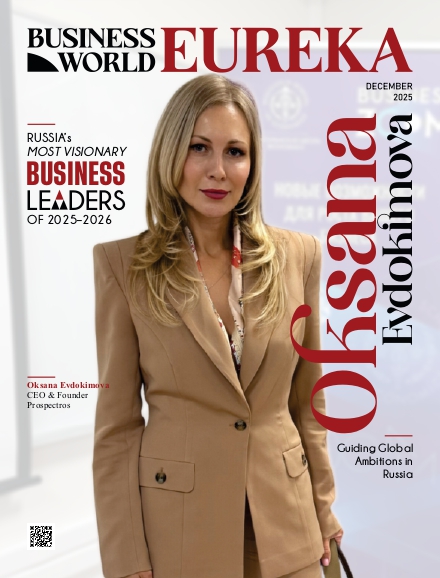Basma El Zein: Turning Scientific Breakthroughs into Practical Solutions

Energy is the lifeblood of modern civilization, yet the way it is produced and consumed remains one of the greatest challenges of our time. With rising demands and growing environmental concerns, the search for sustainable alternatives has never been more urgent. From solar breakthroughs to advanced energy storage, scientists and engineers are working to harness the power of innovation to reshape the future of clean energy. But technology alone is not enough—progress depends on visionaries who can bridge the gap between research and real-world solutions.
Innovation has always been the driving force behind transformation. The greatest advancements often emerge at the crossroads of science and necessity, where bold ideas meet the determination to create lasting change. Whether through nanotechnology, smart materials, or reimagined energy grids, the future of sustainability is being built by those who refuse to accept limitations. It takes leaders who not only push the boundaries of knowledge but also create opportunities for collaboration, mentorship, and meaningful impact.
Basma El Zein stands at the forefront of this movement. A scientist, innovator, and advocate for clean energy, she has dedicated her career to turning scientific breakthroughs into practical solutions.
Quest to Transform Energy Through Innovation
Basma’s path into the renewable energy sector was shaped by personal experiences and a deep commitment to sustainability. Growing up in Lebanon, she witnessed the challenges of energy shortages firsthand, which fueled her passion for finding innovative solutions to improve energy accessibility and sustainability. Encouraged by her father, who emphasized the power of education and societal responsibility, she pursued a degree in Electrical and Electronics Engineering.
Her transition into renewable energy, particularly nanotechnology for solar energy, was sparked by an unexpected moment of inspiration. While presenting her research on “Data Communication over Power Lines” at a conference at Oxford University, she attended a lecture on nanotechnology that profoundly shifted her perspective. Recognizing its potential to revolutionize solar energy, she became determined to explore the field further.
Throughout her career, several key milestones have shaped her leadership in the energy sector. Her research at King Abdullah University of Science and Technology (KAUST) led to groundbreaking innovations in third-generation solar cells, culminating in a patent recognized in both the USA and Europe. This achievement reinforced her belief in the power of scientific research to drive meaningful change.
Vision for a Sustainable and Tech-Driven Future
Beyond research, Basma has played a pivotal role in building ecosystems for innovation. Establishing the Deanship of Scientific Research at the University of Business and Technology (UBT) was a defining moment, allowing her to develop a strong research framework and promote interdisciplinary collaboration. More recently, she has been instrumental in leading the development of UBT TechnoValley, an innovation hub that fosters research and entrepreneurship in energy, electronics, and emerging technologies.
As the Director General of UBT TechnoValley, Basma oversees strategic planning, implementation, and management, ensuring that it serves as a platform for interdisciplinary research, industry collaboration, and technological advancement. Her leadership philosophy is encapsulated in her motto: “Discover, Transfer, Impact.” She believes that true leadership in renewable energy lies in continuously seeking new knowledge, transforming it into practical applications, and ensuring that it creates a tangible impact on society. As the renewable energy sector continues to evolve, she remains committed to pushing the boundaries of innovation and empowering others to do the same.
Breaking Societal Barriers
Navigating the renewable energy sector as a woman has presented both challenges and opportunities for Basma. In an industry traditionally dominated by men, breaking into leadership required perseverance, resilience, and a strong belief in her vision.
One of the primary challenges she faced early in her career was overcoming biases and stereotypes regarding women in engineering and energy. There was often an assumption that technical and leadership roles in this sector were best suited for men. To counter this, Basma knew she had to continuously prove herself—not just once, but at every stage of her career.
She did so by consistently introducing new ideas, innovations, and solutions backed by research, data, and evidence. Whether through her patents in solar nanotechnology, her leadership in establishing research ecosystems, or her contributions to sustainable energy solutions, Basma ensured that her work spoke for itself. She built credibility not through words alone but through tangible achievements, peer-reviewed research, and groundbreaking projects.
Beyond demonstrating technical expertise, stepping into leadership required her to be both a visionary and a team player. She developed the ability to lead with confidence, take responsibility, and foster collaboration, creating an environment where people felt valued and motivated to contribute. Her leadership approach was not about giving orders but about inspiring innovation and guiding teams toward a shared vision.
Another significant challenge was balancing professional growth with personal responsibilities. As a mother of two while leading large-scale research projects, she had to develop effective time management, strong support systems, and clear prioritization. By mastering multitasking, delegation, and organization, she ensured success in both her personal and professional life.
- To overcome these challenges, Basma focused on:
- Innovation and excellence – Staying at the forefront of research and development, leading with groundbreaking solutions that demonstrated real impact.
- Confidence and accountability – Taking full responsibility for her work and decisions, understanding that leadership requires standing by both successes and failures.
- Strategic leadership and teamwork – Balancing authority with collaboration, ensuring that her team felt both guided and empowered.
- Building strong networks – Seeking mentorship from industry leaders, collaborating with global experts, and creating support networks for other women in STEM.
- Resilience and adaptability – Viewing every challenge as an opportunity for growth, remaining flexible and open to change.
Today, Basma stands as an award-winning leader, innovator, and advocate for women in energy, proving that persistence, innovation, and leadership can break barriers. Her journey serves as a testament to the fact that women not only belong in this industry but are essential in shaping its future.
Shaping a More Sustainable World
At the University of Business and Technology, sustainability is a key focus, with contributions to renewable energy through research, innovation, and industry collaboration. UBT’s commitment has earned global recognition, including the 2024 Reuters Global Energy Transition Award and the Makkah Excellence Award for sustainability projects.
As director general of UBT TechnoValley, Basma leads advancements in solar energy, energy storage, and smart grids. The university fosters green innovation by supporting startups, collaborating with industry leaders, and integrating sustainability into education. Aligned with Saudi Vision 2030 and global sustainability goals, UBT also implements energy-efficient infrastructure and renewable projects.
Basma believes that nanotechnology will revolutionize renewable energy. Innovations in solar cells, advanced batteries, and hydrogen production are enhancing efficiency, affordability, and sustainability. With breakthroughs in self-healing nanomaterials and smart energy grids, the future of clean energy is rapidly evolving. Through her work at UBT, Basma continues to drive impactful change, shaping a more sustainable world.
A Call for Equality and Innovation
While progress has been made, achieving true gender equality in STEM and renewable energy requires industry-wide commitment. Basma emphasizes the need for:
- Recognizing women’s contributions by ensuring female scientists receive acknowledgment for their work through awards, patents, and leadership roles.
- Increasing funding for women-led research in clean energy through dedicated scholarships and research grants.
- Expanding mentorship programs to guide young women into leadership roles in STEM.
- Implementing inclusive hiring policies and leadership training to ensure more women enter and advance in STEM careers.
- Supporting women-led startups in clean energy, nanotechnology, and sustainability through incubator programs and investment opportunities.
Accelerating Renewable Energy Adoption
To drive the large-scale adoption of renewable energy, Basma highlights the importance of comprehensive regulatory frameworks that promote innovation, investment, and sustainability. She identifies several essential policy areas:
- Stronger renewable energy mandates—Governments must enforce clean energy targets, net-zero policies, and renewable energy quotas to reduce dependence on fossil fuels.
- Increased research and innovation incentives—Enhanced funding for R&D, tax breaks for clean energy startups, and stronger industry-academic collaborations will accelerate advancements in solar nanotechnology, energy storage, and hydrogen production.
- Green finance and economic support—Transitioning from fossil fuel subsidies to green tax credits, carbon pricing, and low-interest loans will drive renewable energy investments.
- Grid modernization and energy storage regulations—Policies should mandate smart grids, battery integration, and decentralized microgrids to ensure energy stability and efficiency.
- International collaboration and technology transfer—Harmonizing regulations, reducing trade barriers, and strengthening intellectual property protections will improve global clean energy accessibility.
- Workforce development and STEM education—Investing in STEM training, renewable energy education, and research initiatives will cultivate the next generation of clean energy leaders.
- Sustainability and circular economy policies—Mandating recyclable materials, eco-friendly nanotechnology, and renewable energy waste management will minimize environmental impact.
Through her work at UBT and her advocacy for gender diversity and sustainable energy policies, Basma continues to shape the future of renewable energy, ensuring that innovation is inclusive, impactful, and globally transformative.
Revolutionizing Renewable Energy
Basma is currently leading several groundbreaking projects that are transforming the renewable energy landscape through advancements in nanotechnology, energy storage, and sustainable entrepreneurship.
One of her key research initiatives focuses on next-generation perovskite solar cells integrated with graphene and nanomaterials to enhance efficiency, flexibility, and durability. These lightweight, bendable solar cells can be used in wearable electronics, building-integrated photovoltaics, and portable power solutions, expanding solar energy applications beyond traditional panels.
She is also pioneering the development of printed batteries with solid-state electrolytes, which offer higher energy density, longer lifespan, and improved safety compared to conventional lithium-ion batteries. These thin, flexible, and scalable batteries are ideal for renewable energy storage, electric vehicles, and off-grid power solutions, making sustainable energy more accessible and efficient.
In addition, her research in ZnO nanowall-based nanosensors enables high-precision heat and pressure detection, with applications in smart grids, energy efficiency monitoring, and industrial safety. By integrating advanced sensor technology into energy systems, she is improving the reliability and optimization of energy distribution networks.
Blueprint for Women Leading the Clean Energy Revolution
Basma encourages young women aspiring to lead in the renewable energy industry to believe in their potential and never underestimate their ability to innovate. She emphasizes that the industry needs diverse perspectives, bold ideas, and strong female leadership.
She advises aspiring leaders to build technical expertise, stay curious, and continuously learn, as knowledge is a powerful tool. Seeking mentorship, expanding professional networks, and surrounding oneself with supportive peers are essential steps in career growth.
Confidence, resilience, and persistence are key qualities she highlights, recognizing that challenges will arise but can be overcome with passion and determination. She encourages women to take initiative, embrace leadership roles, and advocate for sustainability-driven solutions. Above all, Basma believes that by trusting in their abilities, breaking barriers, and pushing forward, women can make significant contributions to shaping the future of clean energy and global sustainability.
Vision for Nanotech and Clean Energy Innovation
Basma envisions the renewable energy sector evolving significantly over the next five years, driven by advancements in nanotechnology, energy storage, and hydrogen innovations. She anticipates that perovskite solar cells, printed solid-state batteries, and nanosensors will become more efficient, cost-effective, and scalable, fundamentally transforming the industry.
Her primary goal is to transfer her research into real-world applications, ensuring that UBT’s energy projects gain support from both governmental entities and the private sector. Through strategic industry partnerships, commercialization initiatives, and policy alignment, she aims to bridge the gap between research and market-ready solutions. By making clean energy technologies more accessible and scalable on a global level, she hopes to accelerate the transition to a sustainable energy future.
A Legacy of Innovation and Empowerment
For Basma, the most rewarding aspect of her work is seeing cutting-edge research translate into tangible solutions that drive renewable energy innovation and sustainability. Witnessing her projects—perovskite solar cells, printed batteries, and nanosensors—move from research labs to real-world implementation reinforces her commitment to making a meaningful impact in the field.
She hopes her legacy will be defined by pioneering nanotechnology-driven clean energy solutions while inspiring women to lead in STEM and the renewable energy sector. By mentoring future scientists, advocating for women’s leadership, and ensuring her innovations are commercialized and adopted by industries and governments, she strives to leave a lasting impact on clean energy and global sustainability for generations to come.
Latest Editions
-
 Most Influential Personality Redefining the Future of Business in 202605 Feb 2026 magazines
Most Influential Personality Redefining the Future of Business in 202605 Feb 2026 magazines -
 World's Most Inspiring Keynote Speakers to Watch in 2025–2602 Jan 2026 magazines
World's Most Inspiring Keynote Speakers to Watch in 2025–2602 Jan 2026 magazines -
 Russia’s Most Visionary Business Leaders of 2025–202619 Dec 2025 magazines
Russia’s Most Visionary Business Leaders of 2025–202619 Dec 2025 magazines -
 Sheroes: UK's Most Visionary Leader Making Their Mark in the Global Education Landscape, 2025–2602 Dec 2025 magazines
Sheroes: UK's Most Visionary Leader Making Their Mark in the Global Education Landscape, 2025–2602 Dec 2025 magazines -
 Europe’s Most Influential Business Leaders to Watch in 2025-2630 Nov 2025 magazines
Europe’s Most Influential Business Leaders to Watch in 2025-2630 Nov 2025 magazines

